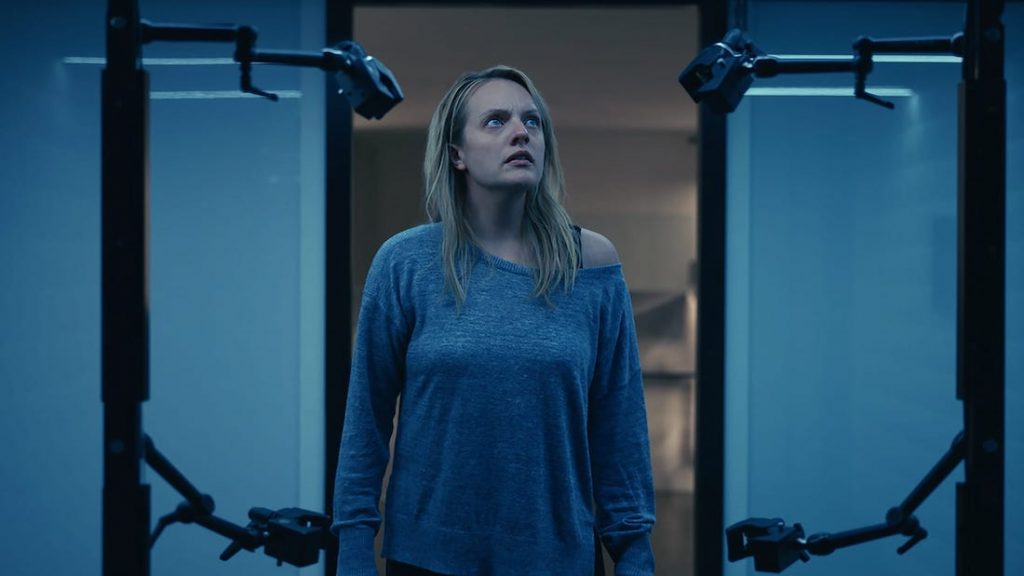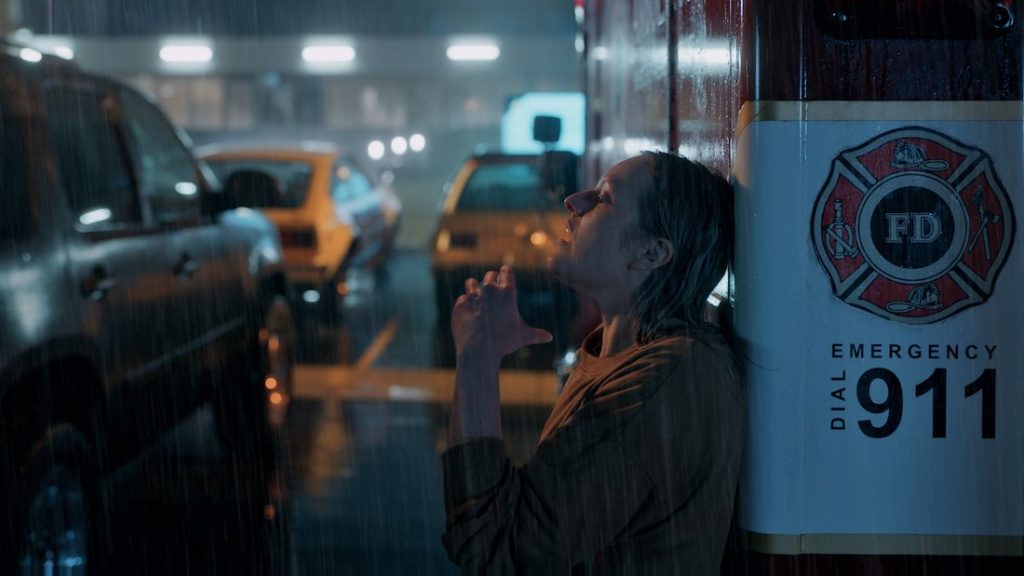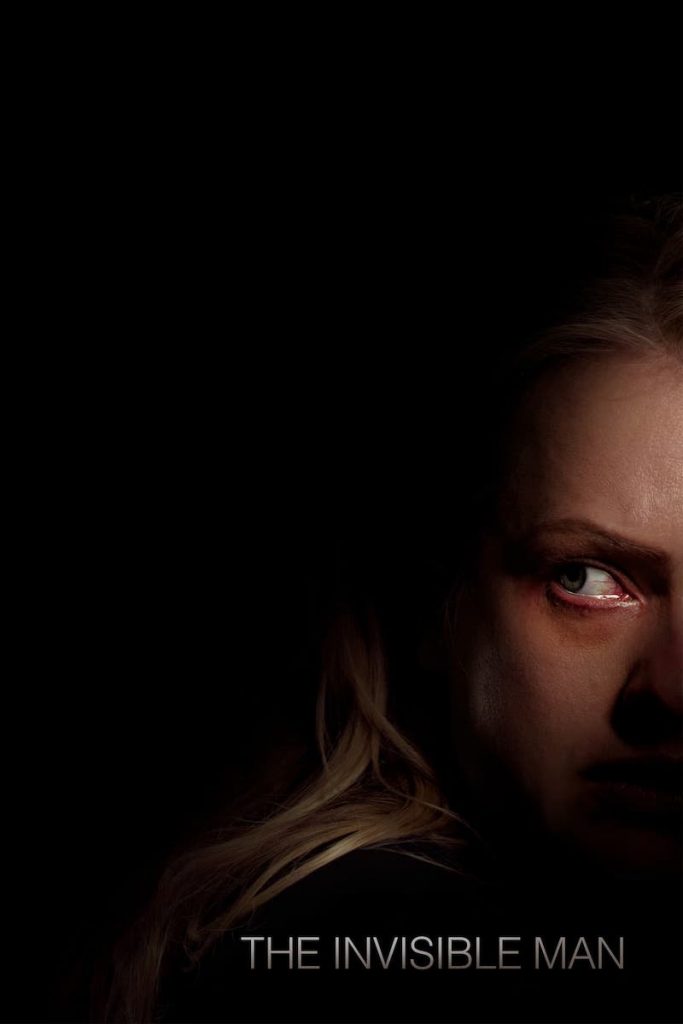THE INVISIBLE MAN (2020)
When a woman's abusive ex takes his own life and leaves her his fortune, she suspects his death was a hoax when she feels his presence afterwards...

When a woman's abusive ex takes his own life and leaves her his fortune, she suspects his death was a hoax when she feels his presence afterwards...


Blumhouse Production’s new version of The Invisible Man is a triumph for Elisabeth Moss, but less of a coup for writer-director Leigh Whannell (Upgrade). Moss’s performance seizes you from the beginning and doesn’t let go, as she’s thoroughly convincing as a woman simultaneously scared and determined, even aggressive, trembling with barely controlled fear and fury, occasionally allowing a smile to surface that hints of a happier past.
Most impressive so far in television shows (The West Wing, Mad Men, The Handmaid’s Tale), here Moss confirms she’s capable of carrying an entire feature fil. The Invisible Man is almost entirely concerned with her experiences and the other characters fade into relative insignificance. It’s a shame, then, that Whannell’s script doesn’t give Moss more to work with, or the other characters more developed personalities for Moss to play against.
There’s great potential in this latest Invisible Man reimagining, which reverses the approach of H.G Wells’s 1897 novel and James Whale’s 1933 classic movie by focusing not on the eponymous character but on one of his victims. It then uses her traumatic experiences to raise questions about our attitudes to domestic abuse and rape.

Nobody believes Cecilia (Moss) when she says she’s being persecuted by an invisible man, and yet she is. Are we similarly quick to dismiss as outlandish other allegations victims of abuse make? Are we unable to see the villains in our midst? Whannell fails to take this far enough, and the result is a film with a strangely static feel. Despite a couple of good visual and aural surprises, one genuinely shocking development, and another twist which makes an interesting point about the different forms that emotional abuse can take, for most of The Invisible Man the core situation doesn’t move forward: Cecilia is being tormented by an invisible man, nobody believes her… and that’s kind of it.
The script (far more than Whannell’s mostly skilful direction) lets the film down in other ways, too. Asking us not to question how invisibility is possible seems reasonable, but it creates nagging plot holes (why is the dog left in the house?), and excessive attention is paid to justifying story elements that don’t require justification. Great care is taken to introduce a pot of paint, a ladder, and a fire extinguisher in normal circumstances so that they can be used later in extraordinary ones, but there’s really no need to establish the presence of such commonplace objects. It’s a kind of inverse Chekhov’s gun fixation.
Apart from the broad idea of a wicked inventor mastering invisibility and then taking advantage of it to commit crime, Whannell’s film owes little to Wells’s novel—which, of course, was set in Victorian England, while this Invisible Man takes place in contemporary America—or to Whale’s movie with Claude Rains in the lead role.

Cecilia is trapped in a nasty relationship with the controlling Adrian (Haunting of Hill House’s Oliver Jackson-Cohen), whose genius in optics technology has made him rich. She flees from their home and takes refuge with her old friend, policeman James (Aldis Hodge). For a brief while they and James’s teenage daughter Sydney (Storm Reid) seem happy enough… until Adrian appears on the scene—or rather, doesn’t appear—to spook Cecilia and drive a wedge between her and James. Just to make sure she doesn’t have anywhere to run, Adrian similarly undermines her relationship with sister Alice (Harriet Dyer), and his harassment becomes progressively more violent. Cecilia then finds herself in increasingly deep trouble as Adrian’s activities are blamed on her, and her insistence that he’s still alive, but is now invisible, raises questions about her mental health to those around her. Eventually, of course, she has to fight back.
Many individual segments of this slightly predictable but nevertheless strong storyline are executed well in isolation. Especially effective is the long, tense opening in Adrian’s angular modernistic house, which is made more sinister by its near-emptiness and the dark doorways punctuating its blank walls. A tripped-over dog bowl and an accidentally-triggered car alarm have rarely been so shocking.
Adrian’s first invisible actions are truly surprising, too, although Whannell misses the opportunity for a film subtler than the rather single-minded one we get. By letting the audience know early on that Adrian really is invisible, the movie perhaps bolsters our identification with Cecilia, but it also removes any doubt about her mental stability. Keeping us guessing longer would’ve added a provocative layer.
Also simple but powerful is Stefan Duscio’s cinematography. There’s a slightly Hitchcockian flavour to parts of The Invisible Man, especially in and around Adrian’s house (it’s in northern California, a favourite location for Hitch), and the changes in mood as the movie proceeds are signalled well by the visual style. The opening scenes in Cecilia and Aidan’s joyless home are so stark they feel almost black-and-white; then there’s cosy warm lighting and carefully complementary colours in James’s abode; then finally Duscio returns to colder tones as Cecilia seems to find herself in a hopeless and friendless situation.

There are some decent performances alongside Moss’s masterful one, too, especially from 16-year-old Reid and Michael Dorman as Adrian’s brother, who’s intriguingly difficult to read. Has he been emotionally hurt himself by Adrian, as he claims, or is he “the jellyfish version of him, everything but the spine”, as another character describes?
Less helpful is Jackson-Cohen’s exaggeratedly vile Adrian, quivering and tooth-bearing, although we hardly see him—of course. The music by Benjamin Wallfisch is disappointing as well, being an obvious and unsophisticated score. And that’s surprising given his track record, including a collaboration with Hans Zimmer on Blade Runner 2049 (2017).
The VFX, meanwhile, is a little too reminiscent of Predator (1987). Still, it’s largely concentrated toward the end of the film in a tedious sequence where invisible Adrian takes on armed men, one by one, by which point we’ve stopped caring too much because we’ve long accepted the points that (a) he’s invisible, (b) he’s bad, and (c) he’s threatening to Cecilia. The movie hasn’t taken us anywhere further along.
A more thoughtful, less superficial script might’ve made The Invisible Man a very good, perhaps even nearly outstanding movie. Most of the other ingredients are there, and Whannell’s take on Wells’s premise is an original one for modern times. But, as it is, a fine performance from Elisabeth Moss as a victim fighting back is unmatched by a tale which, for all its production values, only rises above flatness in a few moments.


director: Leigh Whannell.
writer: Leigh Whannell (based on the novel by H.G Wells).
starring: Elisabeth Moss, Aldis Hodge, Storm Reid, Harriet Dyer, Michael Dorman & Oliver Jackson-Cohen.
